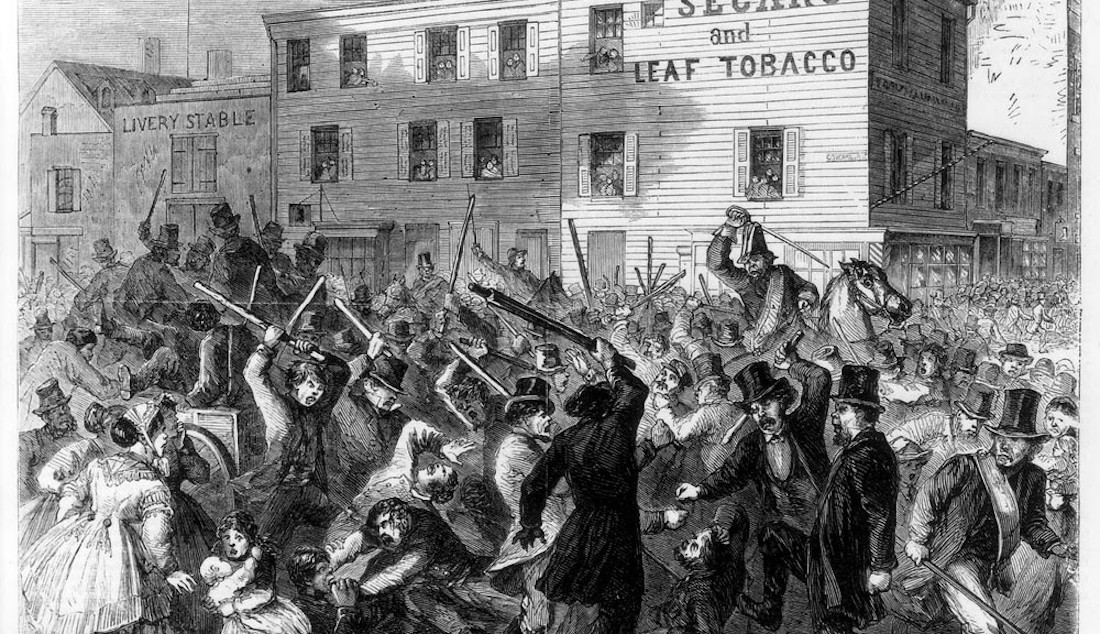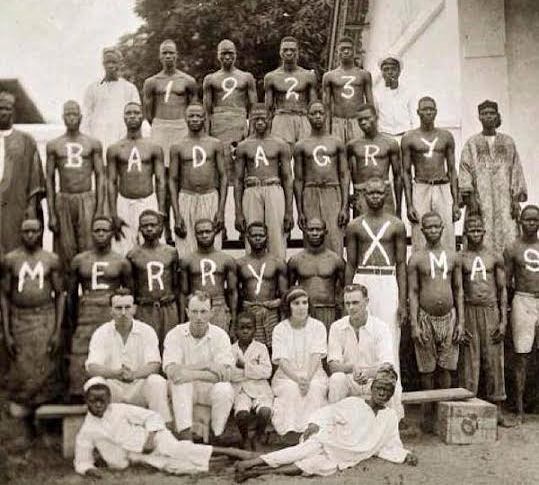The 19th century marked a pivotal era when Americans reshaped the celebration of Christmas, turning it from a boisterous carnival into a day of family-centred peace and nostalgia. The societal changes of the early 1800s, characterised by class conflict and upheaval, played a significant role in shaping the American approach to Christmas.
During this time, high unemployment and gang rioting among the disenchanted classes, especially during the Christmas season, prompted the New York City Council to establish the city’s first police force in 1828 in response to a Christmas riot. This period of unrest spurred members of the upper classes to reconsider the way Christmas was observed in America.

New York City Christmas Riot of 1806 – Source: The Bowery Boys
In 1819, renowned author Washington Irving contributed to this transformation with “The Sketchbook of Geoffrey Crayon, gent.,” a collection of stories portraying Christmas celebrations in an English manor house. Irving envisioned a peaceful and warm-hearted holiday that brought people together across social and economic divides. Despite being a work of fiction, Irving’s sketches influenced the perception of true Christmas customs.
Around the same time, English author Charles Dickens penned the timeless holiday tale, “A Christmas Carol,” emphasising the significance of charity and goodwill toward all. This narrative resonated powerfully in the United States and England, illustrating to Victorian society the benefits of celebrating Christmas.
As the family structure evolved to become more attuned to the emotional needs of children, Christmas became an occasion for families to lavish attention and gifts on their children without fear of spoiling them.
With the growing acceptance of Christmas as a family-oriented holiday, Americans sought inspiration from recent immigrants, Catholic and Episcopalian churches, and various customs for celebrating the day.
Over the next century, Americans forged a unique Christmas tradition that incorporated elements from various customs, including tree decorating, sending holiday cards, and gift-giving.

Santa Claus lived in Turkey as St Nicholas – Source: Turkish Travel Blog
The legend of Santa Claus, tracing back to St. Nicholas in Turkey during the 3rd century, gained popularity in the late 18th century in New York among Dutch families who honoured “Sinter Klaas.” Episcopal minister Clement Clarke Moore’s 1822 Christmas poem, “An Account of a Visit from St. Nicholas,” contributed to the modern image of Santa Claus, as immortalised by political cartoonist Thomas Nast in 1881.
Amid these transformations, Christmas facts have emerged, such as the annual sale of 25-30 million real Christmas trees in the United States, the rowdy celebrations during the Middle Ages, the temporary cancellation of Christmas in Boston from 1659 to 1681, and the declaration of Christmas as a federal holiday in the United States on June 26, 1870.
Additional trivia includes the first consumption of eggnog in Captain John Smith’s 1607 Jamestown settlement, the naming of Poinsettia plants after American minister Joel R. Poinsett, the Salvation Army’s Santa Claus-clad donation collectors since the 1890s, the creation of Rudolph in 1939 by copywriter Robert L. May, and the initiation of the Rockefeller Center Christmas tree tradition by construction workers in 1931.
Read also: The origins of Christmas – Part 1
Nigeria’s first Christmas
The roots of Christmas in Nigeria trace back to the repatriation of freed slaves from the United States to Africa, commencing in 1820. Among the settlers in Badagry, Lagos State, in 1838 was James Fergurson, a devout Methodist. Disturbed by the lack of missionaries in his community, Fergurson sought permission from the King of Badagry to invite missionaries from Sierra Leone.
In response, on September 23, 1840, Reverend Thomas Birch Freeman, born to an African freed slave and an English mother, arrived in Badagry. His mission was to propagate the gospel of Christ. Freeman’s first sermon took place under the Agia tree in Asisoe Tin, Badagry, the day after his arrival.
Several weeks later, Freeman was invited by the Alake of Egbaland, Alake Sodeke, to preach in Abeokuta, Ogun State. Upon his return to Badagry, he encountered Reverend Henry Townsend of the Church Missionaries Society. Together, Freeman and Townsend conducted the first Christmas service under the Agia tree on December 25, 1842. The event drew a diverse audience of local Christians, repatriated ex-slaves, and Europeans in Badagry.

Source: FLATIMES
In villages, Christmas is celebrated with religious fervour, coinciding with traditional year-end festivities. The day typically begins with a Christmas carol and Thanksgiving service, followed by communal gatherings in churches or homes where people share food, drinks, and joy. However, Christmas is particularly special for children, who showcase their creativity and receive gifts from elders.
In certain regions, especially the Southeast, children embody masquerades, parading from house to house to receive food and gifts. In the northern states, where Muslim populations dominate, it’s common to witness Christians and Muslims sharing meals and exchanging gifts, fostering a spirit of camaraderie. Despite its humble beginnings, Christmas in Nigeria has evolved into a cherished time of the year for many.
Freeman and Townsend held the first Christmas service under the Agia tree on the 25th of December 1842. It was well attended by the Christian community of local folks, repatriated ex-slaves, and Europeans living in Badagry. Townsend opened the ceremony with a passage from the Bible while Freeman preached a sermon titled “The Incarnation Redeemer of Mankind.”
Gathering under the Agia tree to celebrate Christmas became a tradition that lasted for many years until a storm uprooted the tree in June 1959, after 300 years of existence. A monument was erected there to replace the tree, and the Methodist Church of Nigeria has revealed plans to build a chapel there as a place of pilgrimage. This humble beginning of Christmas has since been overshadowed by a new wave of celebrations that mirror imported traditions mixed with local ones.
In cities, the religious solemnity of the season has reduced significantly. Christmas is a time for fun fare, gifts, new clothes, delicious food, village trips, and decorations that adorn homes, streets, and parks. Nonetheless, droves of Christians congregate in churches on Christmas mornings for extravagant Christmas carol services.











